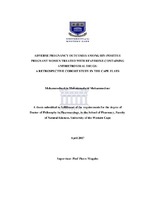| dc.contributor.advisor | Mugabo, Pierre | |
| dc.contributor.author | Mohammednur, Mohammedmekin Mohammedseid | |
| dc.date.accessioned | 2018-08-02T12:27:41Z | |
| dc.date.available | 2018-08-02T12:27:41Z | |
| dc.date.issued | 2017 | |
| dc.identifier.uri | http://hdl.handle.net/11394/6185 | |
| dc.description | Doctor Pharmaceuticae - Dpharm | en_US |
| dc.description.abstract | The use of efavirenz (EFV) in the first trimester of pregnancy
remains controversial. In South Africa, the use of EFV-containing antiretroviral
therapy (ART) as part of a Fixed Dose Combination (FDC) during the first
trimester of pregnancy started in April, 2013. Literature to date has reported
conflicting outcomes following the use of EFV-containing ART during the first
trimester of pregnancy. The objectives of the study were to determine the
prevalence of adverse pregnancy outcomes among HIV-positive pregnant women
treated with EFV-containing ART and compare these results with those of pregnant
women treated with NVP-containing ART and HIV-negative pregnant women in
resource-limited settings. In addition, the study also aimed to determine the effect
of the time of initiation of ART on the prevalence of adverse pregnancy outcomes. | en_US |
| dc.language.iso | en | en_US |
| dc.publisher | University of the Western Cape | en_US |
| dc.subject | Adverse pregnancy outcomes | en_US |
| dc.subject | Antiretroviral drug | en_US |
| dc.subject | Birth defect | en_US |
| dc.subject | Efavirenz | en_US |
| dc.subject | First trimester | en_US |
| dc.subject | HIV | en_US |
| dc.subject | Low birth weight | en_US |
| dc.subject | Nevirapine | en_US |
| dc.subject | Pregnant women | en_US |
| dc.subject | Preterm delivery | en_US |
| dc.title | Adverse pregnancy outcomes among HIV-positive pregnant women treated with efavirenz-containing antiretroviral drugs: a retrospective cohort study in the Cape Flats | en_US |
| dc.type | Thesis | en_US |
| dc.rights.holder | University of the Western Cape | en_US |

